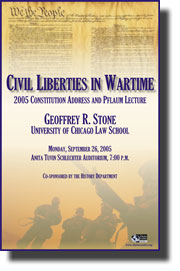September 26, 2005
Civil Liberties in War Time
2005 Constitution Address
Anita Tuvin Schlechter Auditorium, 7:00 p.m.
Issue in Context
Wartime often leads the U.S. government into bestowing various demands on its citizens to help provide for the common defense. For example, the government has enacted conscription, commandeered property, and rationed resources.
Also during those times, the government has felt it necessary to restrict certain civil liberties for the sake of national security. The Sedition Act of 1798 was implemented to silence political dissent as our founders feared a war with France. During the Civil War, habeas corpus was suspended to imprison and exile Confederate sympathizers. In the 20th century, paranoia over possible invasions and infiltrations by enemies led to the Espionage Act of 1917, the internment of Japanese-American citizens during World War II, and the explosion of McCarthyism at the dawn of the Cold War.
Now, as America is once again immersed in war, the government is trying to balance civil liberties with threats from terrorists. Soon after 9/11, Congress passed the PATRIOT ACT, which authorized law enforcement officials to use invasive methods to investigate terror suspects. As the war in Iraq intensified, especially during the 2004 election, protesters claimed that the government required an unacceptable amount of red-tape when organizing demonstrations.
How can we learn from the errors of the past and prepare for the threats of the future to ensure a better American democracy?
About the Speaker
Kalven Jr. Distinguished Service Professor of Law at his alma mater, the University of Chicago Law School. He has been a faculty member since 1973, and served as dean of the law school from 1987-1994. Since 1991, Stone has been the chief editor of the Supreme Court Review.
In 1972, he served as a law clerk to Supreme Court Justice William J. Brennan, Jr. Stone has litigated several Supreme Court cases involving First Amendment rights. He has aided in representing such notable figures as President Clinton and Fred Korematsu, a Japanese-American interned during World War II.
Among Stone’s numerous works is his most recent book, the award-winning Perilous Times: Free Speech in Wartime from the Sedition Act of 1798 to the War on Terrorism.
Stone is also an active leader in several national organizations, including the National Advisory Council of the American Civil Liberties Union and the Board of Governors of the American Constitution Society.
